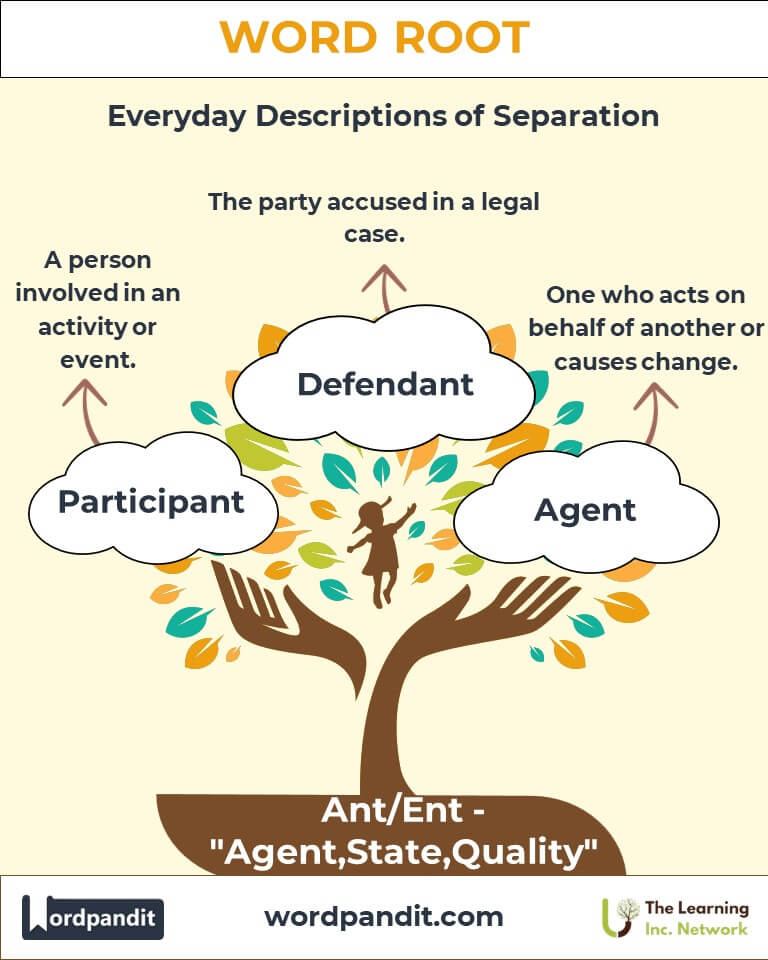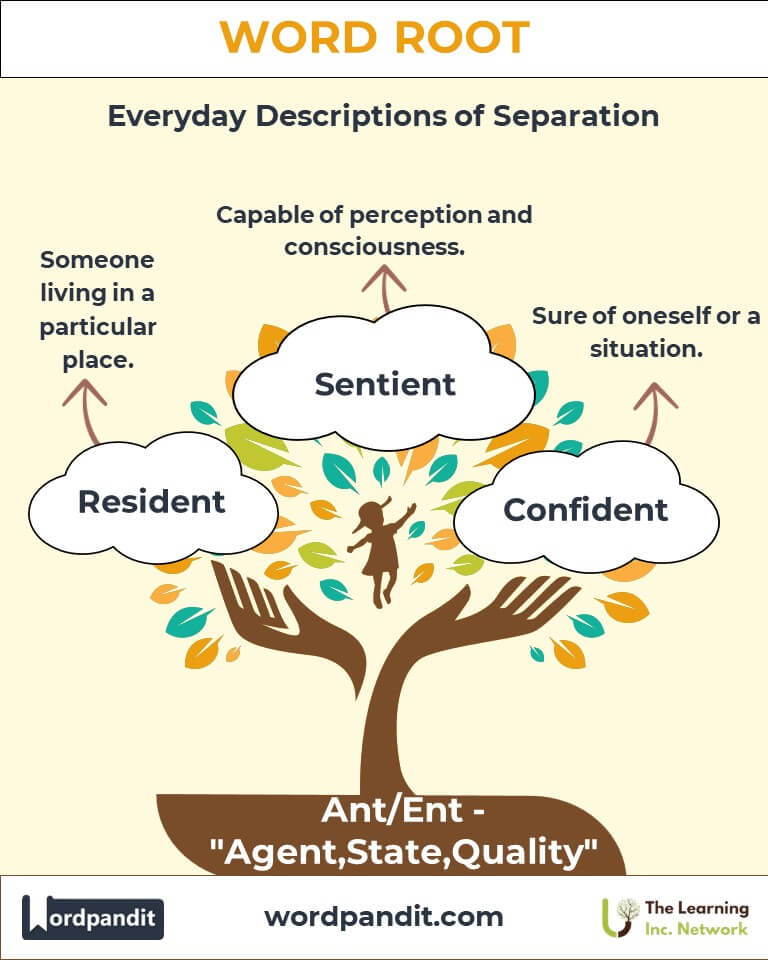Ant/Ent: Catalysts of Action and Being
Byline: Explore the dynamic essence of the Ant/Ent word roots, signifying agency, state, or quality, from ancient linguistic origins to modern scientific, literary, and everyday applications. Understand how these roots embody action, existence, and properties across diverse contexts.

Table of Contents
- Introduction: A Legacy of Action and Being
- Etymology and Historical Journey
- Mnemonic: Unlocking the Power of Ant/Ent
- Common Ant/Ent-Related Terms
- Ant/Ent Through Time
- Ant/Ent in Specialized Fields
- Illustrative Story: Ant/Ent in Action
- Cultural Significance of Ant/Ent
- The Ant/Ent Family Tree
- FAQs about the Ant/Ent Word Root
- Test Your Knowledge: Ant/Ent Mastery Quiz
- Conclusion: The Living Legacy of Ant/Ent
1. Introduction: A Legacy of Action and Being
What does it mean to act or exist? The Ant/Ent roots explore these profound concepts. Derived from Latin participles, they signify an active agent (e.g., "student") or a state/quality (e.g., "confident"). Pronounced as "ant" or "ent" depending on context, these versatile roots are fundamental to many languages and disciplines, from grammar to philosophy, emphasizing action and existence in their myriad forms.

2. Etymology and Historical Journey
The roots Ant/Ent originate from Latin present participles: -ans and -entis, denoting ongoing action or qualities. For example:
- Amans (loving) evolved into "amante" (lover).
- Scient (knowing) led to "scientist" (one who knows).
These roots expanded through Romance languages, becoming suffixes in English, often indicating nouns or adjectives. They encapsulate both dynamic activity (agent, one who acts) and intrinsic states (evident, something clear).
3. Mnemonic: Unlocking the Power of Ant/Ent
Picture an ant constantly on the move, embodying action and purpose. Now think of an entrant, entering a space with intention or being present. This vivid imagery helps connect Ant/Ent to roles (active agents) and states (qualities).
Mnemonic Device: "Ants act; entrants exist."
4. Common Ant/Ent-Related Terms
- Participant (par-tis-i-pant): A person involved in an activity or event.
Example: "The participant eagerly shared their project during the science fair." - Resident (rez-i-dent): Someone living in a particular place.
Example: "The resident of the old mansion loved telling ghost stories." - Confident (kon-fi-dent): Sure of oneself or a situation.
Example: "Her confident demeanor impressed the interview panel." - Significant (sig-nif-i-kant): Having importance or meaning.
Example: "The discovery was significant for medical research." - Agent (ay-jent): One who acts on behalf of another or causes change.
Example: "The agent negotiated a fair deal for the artist."
5. Ant/Ent Through Time
1. From Action to Identity: In ancient texts, "ant" suffixes often signified action:
- Servant: Originally denoting one who serves.
Over time, these terms also came to denote identity:
- Modern servant: Implies a broader societal or professional role.
2. From Quality to Abstraction: Adjectives like apparent (clearly visible) evolved into abstract forms:
- Appearance: Denoting perception rather than reality.
6. Ant/Ent in Specialized Fields
- Law:
Defendant: The party accused in a legal case.
Importance: Central to judicial processes and fairness in trials. - Medicine:
Patient: Someone receiving medical care.
Application: Reflects both the state of being treated and enduring conditions. - Linguistics:
Current: Reflecting present action or state.
Usage: Essential in grammatical tense and meaning. - Technology:
Agent: A software entity performing tasks autonomously.
Example: Chatbots as agents for customer support. - Philosophy:
Sentient: Capable of perception and consciousness.
Relevance: A cornerstone in ethics and debates on artificial intelligence.
7. Illustrative Story: Ant/Ent in Action
Dr. Elena Argent was a leading agent in her field, known for her confident theories on sentient machines. When tasked to solve a legal case involving AI's rights, she examined whether the defendant—a self-learning robot—was a participant in conscious decision-making. Her findings, based on clear and evident data, were significant, sparking debates that reshaped policies on technological autonomy.
8. Cultural Significance of Ant/Ent
Ant/Ent roots mirror human fascination with identity and agency. From religious texts depicting divine agents to literary explorations of sentience, these roots encapsulate humanity's quest to understand action, being, and purpose.

9. The Ant/Ent Family Tree
- -Ary (Latin, relating to):
Example: Secretary – Someone aiding in tasks. - -Or (Latin, one who):
Example: Actor – A performer of roles. - -Er (Old English, agent):
Example: Writer – One who writes.

FAQs About the Ant/Ent Word Root
Q: What do the Ant/Ent roots signify?
A: These roots signify agency, action, or a state/quality. For example, in "participant," -ant denotes someone actively taking part in something, while in "confident," -ent highlights a quality or state of assurance.
Q: Are all Ant/Ent words nouns?
A: No. While many are nouns (e.g., "resident"), some are adjectives (e.g., "confident") or even function as both depending on context. For example, "patient" can describe a quality (adjective) or a person receiving medical care (noun).
Q: Why are there two variants, -ant and -ent?
A: The variation stems from their Latin origins. Both derive from participial endings: -ans and -entis. The choice between them often depends on phonetic ease, the influence of French, and the specific word’s history in English.
Q: How does "agent" reflect the Ant/Ent root meaning?
A: The term "agent" perfectly illustrates the root’s focus on action. It represents someone or something performing an act or causing change, emphasizing the active nature associated with the root.
Q: Can AI be described with Ant/Ent terms?
A: Yes, terms like "agent" are used for AI entities capable of autonomous tasks. As AI technology advances, the philosophical use of terms like "sentient" may become relevant.
Test Your Knowledge: Ant/Ent Mastery Quiz
1. Which field uses "sentient" most?
2. What does "resident" describe?
3. What quality does "confident" highlight?
4. Identify the noun among these:
5. Which root denotes action?

12. Conclusion: The Living Legacy of Ant/Ent
The Ant/Ent roots weave a tapestry of action, being, and quality. From ancient Latin to AI ethics, they capture humanity’s drive to define agency and existence. Their continued evolution in law, science, and technology ensures their relevance, reflecting the timeless nature of action and state in shaping language and thought.











